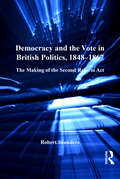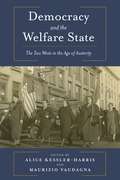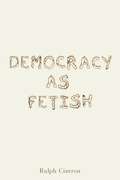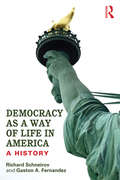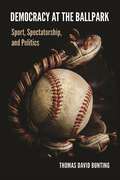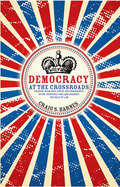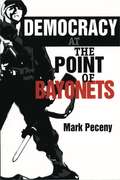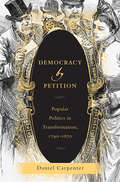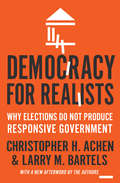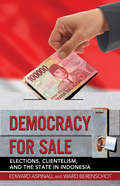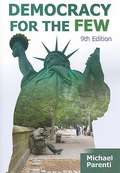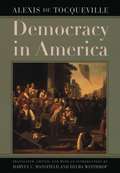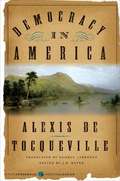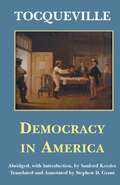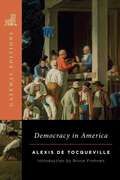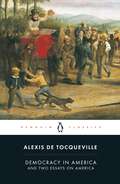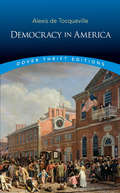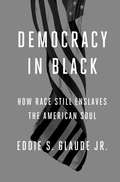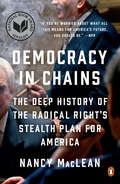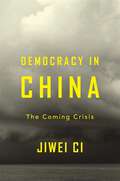- Table View
- List View
Democracy and the Vote in British Politics, 1848-1867: The Making of the Second Reform Act
by Robert SaundersThe Second Reform Act, passed in 1867, created a million new voters, doubling the electorate and propelling the British state into the age of mass politics. It marked the end of a twenty year struggle for the working class vote, in which seven different governments had promised change. Yet the standard works on 1867 are more than forty years old and no study has ever been published of reform in prior decades. This study provides the first analysis of the subject from 1848 to 1867, ranging from the demise of Chartism to the passage of the Second Reform Act. Recapturing the vibrancy of the issue and its place at the heart of Victorian political culture, it focuses not only on the reform debate itself, but on a whole series of related controversies, including the growth of trade unionism, the impact of the 1848 revolutions and the discussion of French and American democracy.
Democracy and the Welfare State: The Two Wests in the Age of Austerity
by Alice Kessler-Harris Maurizio VaudagnaAfter World War II, states on both sides of the Atlantic enacted comprehensive social benefits to protect working people and constrain capitalism. A widely shared consensus specifically linked social welfare to democratic citizenship, upholding greater equality as the glue that held nations together. Though the "two Wests," Europe and the United States, differ in crucial respects, they share a common history of social rights, democratic participation, and welfare capitalism. But in a new age of global inequality, welfare-state retrenchment, and economic austerity, can capitalism and democracy still coexist?In this book, leading historians and social scientists rethink the history of social democracy and the welfare state in the United States and Europe in light of the global transformations of the economic order. Separately and together, they ask how changes in the distribution of wealth reshape the meaning of citizenship in a post-welfare-state era. They explore how the harsh effects of austerity and inequality influence democratic participation. In individual essays as well as interviews with Ira Katznelson and Frances Fox Piven, contributors from both sides of the Atlantic explore the fortunes of the welfare state. They discuss distinct national and international settings, speaking to both local particularities and transnational and transatlantic exchanges. Covering a range of topics—the lives of migrant workers, gender and the family in the design of welfare policies, the fate of the European Union, and the prospects of social movements—Democracy and the Welfare State is essential reading on what remains of twentieth-century social democracy amid the onslaught of neoliberalism and right-wing populism and where this legacy may yet lead us.
Democracy as Fetish (RSA Series in Transdisciplinary Rhetoric #13)
by Ralph CintronDemocracy has long been fetishized. Consequently, how we speak about democracy and what we expect from democratic governance are at odds with practice. With unflinching resolve, this book probes the theory of democracy and how the left and right are fascinated by it.In this innovative multidisciplinary study, Ralph Cintron provides sustained analysis of our political discourse. He shows not only how the rhetoric of democracy produces strong desires for social order, global wealth, and justice but also how these desires cannot be satisfied. Throughout his discussion, Cintron includes ethnographic research from fieldwork conducted over the course of twenty years in the Latino neighborhoods of Chicago, where he observes both citizens and the undocumented looking to democracy to fulfill their highest aspirations. Politicians hand out favors to the elite, developers strong-arm aldermen, and the disenfranchised have little redress. The problem, Cintron argues, is that the conditions required to put democracy into practice—territory, a bordered nation-state, citizens, property—are constituted by inequality and violence, because there is no inclusivity that does not also exclude.Drawing on ethnography, economics, political theory, and rhetorical analysis, Cintron makes his case with tremendous analytic rigor. This challenge to reassess the discourses on democracy and to consider democratic politics as always compromised by oligarchy will be of particular interest to political and rhetorical theorists.
Democracy as Fetish (RSA Series in Transdisciplinary Rhetoric)
by Ralph CintronDemocracy has long been fetishized. Consequently, how we speak about democracy and what we expect from democratic governance are at odds with practice. With unflinching resolve, this book probes the theory of democracy and how the left and right are fascinated by it.In this innovative multidisciplinary study, Ralph Cintron provides sustained analysis of our political discourse. He shows not only how the rhetoric of democracy produces strong desires for social order, global wealth, and justice but also how these desires cannot be satisfied. Throughout his discussion, Cintron includes ethnographic research from fieldwork conducted over the course of twenty years in the Latino neighborhoods of Chicago, where he observes both citizens and the undocumented looking to democracy to fulfill their highest aspirations. Politicians hand out favors to the elite, developers strong-arm aldermen, and the disenfranchised have little redress. The problem, Cintron argues, is that the conditions required to put democracy into practice—territory, a bordered nation-state, citizens, property—are constituted by inequality and violence, because there is no inclusivity that does not also exclude.Drawing on ethnography, economics, political theory, and rhetorical analysis, Cintron makes his case with tremendous analytic rigor. This challenge to reassess the discourses on democracy and to consider democratic politics as always compromised by oligarchy will be of particular interest to political and rhetorical theorists.
Democracy as a Way of Life in America: A History
by Richard Schneirov Gaston A. FernandezThe United States is a nation whose identity is defined by the idea of democracy. Yet democracy in the U.S. is often taken for granted, narrowly understood, and rarely critically examined. In Democracy as a Way of Life in America, Schneirov and Fernandez show that, much more than a static legacy from the past, democracy is a living process that informs all aspects of American life. The authors trace the story of American democracy from the revolution to the present, showing how democracy has changed over time, and the challenges it has faced. They examine themes including individualism, foreign policy, the economy, and the environment, and reveal how democracy has been deeply involved in these throughout the country’s history. Democracy as a Way of Life in America demonstrates that democracy is not simply a set of institutions or practices such as the right to vote or competing political parties, but a complex, multi-dimensional phenomenon, whose animating spirit can be found in every part of American culture and society. This vital and engaging narrative should be read by students of history, political science, and anyone who wants to understand the nature of American democracy.
Democracy at the Ballpark: Sport, Spectatorship, and Politics
by Thomas David BuntingWhat is the relationship between sports and politics? Often, politics are thought to be serious, whereas sports are diversionary and apolitical. Using baseball as a case study, Democracy at the Ballpark challenges this understanding, examining politics as they emerge at the ballpark around spectatorship, community, equality, virtue, and technology. Thomas David Bunting argues that because spectators invest time and meaning in baseball, the game has power as a metaphor for understanding and shaping politics. The stories people see in baseball mirror how they see the country, politics, and themselves. As a result, democracy resides not only in exclusive halls tread by elites but also in a stadium full of average people together under an open sky. Democracy at the Ballpark bridges political theory and sport, providing a new way of thinking about baseball. It also demonstrates the democratic potential of spectatorship and rethinks the role of everyday institutions like sport in shaping our political lives, offering an expanded view of democracy.
Democracy at the Crossroads: Princes, Peasants, Poets, and Presidents in the Struggle for (and against) the Rule of Law (Speaker's Corner Ser.)
by Craig S. BarnesSome were warriors. Some were lawyers, some historians, some moved by an inner passion so great that they appeared to move against kingly power like moths to the flame, risking, and often giving, their lives. They wrote, cajoled, and sometimes cried out for all to hear that the law is above the king.This fascinating treatise examines how Western ideals of democracy have evolved and emerged through the ages and across continents. Craig S. Barnes shares the inspiring stories of a diverse group of men and women (whether they be leaders, poets, or peasants) who pioneered due process, habeas corpus, and the balance of powers. Exploring the premise that "democracy is not a given in social evolution," Barnes contrasts the heroic figures of history to those in recent administrations who he argues have ignored the precious nature of our inheritance and have placed democracy at risk. Democracy at the Crossroads is a stirring reminder of the fragility of our rule of law and the need for vigilant protection of our hard-won liberties.Craig S. Barnes began his career as a public interest lawyer dealing with women's rights and the environment. He was also active in politics and civil rights, running for Congress in Denver as a peace candidate in 1970. He is the author of Growing Up True and In Search of the Lost Feminine.
Democracy at the Point of Bayonets (G - Reference, Information and Interdisciplinary Subjects)
by Mark PecenyNo country has worked harder to coerce others to adopt liberal institutions than the United States. This book examines the promotion of democracy during U.S. military interventions in the twentieth century, showing it to be one of the central ways in which the United States attempts to reconcile the potential contradictions involved in being a liberal great power. Examining interventions from the Spanish-American War through recent actions in Bosnia, Mark Peceny shows how the United States has encouraged the institution of free elections and other liberal reforms—often at the point of bayonets. Peceny applies statistical analysis to ninety-three cases of intervention and presents six case studies: Cuba and the Philippines after the Spanish-American War, Vietnam during the Kennedy administration, El Salvador during Reagan's first term, and Clinton's interventions in Haiti and Bosnia. By forging a synthesis of realist and domestic liberal approaches, Peceny illuminates the roles that both security concerns and liberal values play in the formulation and implementation of foreign policy. He shows how presidents often initially choose proliberalization policies to serve U.S. security interests and how Congress exerts pressure when presidents fail to take the initiative. Under these circumstances, he shows, presidents use the promotion of democracy to build domestic political consensus and to legitimize interventions. Although the United States has failed to promote democracy in most interventions, Peceny demonstrates that it has often had a profound and positive impact on the democratization of target states. His study offers new insight into the relationship between American power, the promotion of democracy, and prospects for the liberal peace in the decades to come.
Democracy by Petition: Popular Politics in Transformation, 1790-1870
by Daniel CarpenterThis pioneering work of political history recovers the central and largely forgotten role that petitioning played in the formative years of North American democracy. Known as the age of democracy, the nineteenth century witnessed the extension of the franchise and the rise of party politics. As Daniel Carpenter shows, however, democracy in America emerged not merely through elections and parties, but through the transformation of an ancient political tool: the petition. A statement of grievance accompanied by a list of signatures, the petition afforded women and men excluded from formal politics the chance to make their voices heard and to reshape the landscape of political possibility. Democracy by Petition traces the explosion and expansion of petitioning across the North American continent. Indigenous tribes in Canada, free Blacks from Boston to the British West Indies, Irish canal workers in Indiana, and Hispanic settlers in territorial New Mexico all used petitions to make claims on those in power. Petitions facilitated the extension of suffrage, the decline of feudal land tenure, and advances in liberty for women, African Americans, and Indigenous peoples. Even where petitioners failed in their immediate aims, their campaigns advanced democracy by setting agendas, recruiting people into political causes, and fostering aspirations of equality. Far more than periodic elections, petitions provided an everyday current of communication between officeholders and the people. The coming of democracy in America owes much to the unprecedented energy with which the petition was employed in the antebellum period. By uncovering this neglected yet vital strand of nineteenth-century life, Democracy by Petition will forever change how we understand our political history.
Democracy for Realists: Why Elections Do Not Produce Responsive Government
by Larry M. Bartels Christopher H. AchenDemocracy for Realists assails the romantic folk-theory at the heart of contemporary thinking about democratic politics and government, and offers a provocative alternative view grounded in the actual human nature of democratic citizens.Christopher Achen and Larry Bartels deploy a wealth of social-scientific evidence, including ingenious original analyses of topics ranging from abortion politics and budget deficits to the Great Depression and shark attacks, to show that the familiar ideal of thoughtful citizens steering the ship of state from the voting booth is fundamentally misguided. They demonstrate that voters—even those who are well informed and politically engaged—mostly choose parties and candidates on the basis of social identities and partisan loyalties, not political issues. They also show that voters adjust their policy views and even their perceptions of basic matters of fact to match those loyalties. When parties are roughly evenly matched, elections often turn on irrelevant or misleading considerations such as economic spurts or downturns beyond the incumbents' control; the outcomes are essentially random. Thus, voters do not control the course of public policy, even indirectly.Achen and Bartels argue that democratic theory needs to be founded on identity groups and political parties, not on the preferences of individual voters. Now with new analysis of the 2016 elections, Democracy for Realists provides a powerful challenge to conventional thinking, pointing the way toward a fundamentally different understanding of the realities and potential of democratic government.
Democracy for Sale: Elections, Clientelism, and the State in Indonesia
by Edward Aspinall Ward BerenschotDemocracy for Sale is an on-the-ground account of Indonesian democracy, analyzing its election campaigns and behind-the-scenes machinations. Edward Aspinall and Ward Berenschot assess the informal networks and political strategies that shape access to power and privilege in the messy political environment of contemporary Indonesia.In post-Suharto Indonesian politics the exchange of patronage for political support is commonplace. Clientelism, argue the authors, saturates the political system, and in Democracy for Sale they reveal the everyday practices of vote buying, influence peddling, manipulating government programs, and skimming money from government projects. In doing so, Aspinall and Berenschot advance three major arguments. The first argument points toward the role of religion, kinship, and other identities in Indonesian clientelism. The second explains how and why Indonesia's distinctive system of free-wheeling clientelism came into being. And the third argument addresses variation in the patterns and intensity of clientelism. Through these arguments and with comparative leverage from political practices in India and Argentina, Democracy for Sale provides compelling evidence of the importance of informal networks and relationships rather than formal parties and institutions in contemporary Indonesia.
Democracy for the Few (9th edition)
by Michael ParentiDEMOCRACY FOR THE FEW is a provocative interpretation of American Government. It shows how democracy is repeatedly violated by corporate oligopolies, and how popular forces have fought back and occasionally made gains in spite of the system. By focusing on the relationship between economic power and political power, discussing actual government practices and policies, conspiracies, propaganda, fraud, secrecy and other ploys of government and politics, this book stands apart in its analysis of how US Government works.
Democracy in America
by Alexis De Tocqueville Harvey C. Mansfield Delba Winthrop[This text is listed as an example that meets Common Core Standards in English language arts in grades 11-12 at http://www.corestandards.org.]
Democracy in America
by Alexis De TocquevilleOriginally penned in the mid-eighteenth century by Frenchman Alexis de Tocqueville, Democracy in America remains the most penetrating and astute picture of American life, politics, and morals ever written, as relevant today as when it first appeared in print nearly two hundred years ago. This edition, meticulously edited by the distinguished de Tocqueville scholar J. P. Mayer, is widely recognized as the preeminent translation. <P><P>[This text is listed as an example that meets Common Core Standards in History and Social Studies in grades 11-12 at http://www.corestandards.org.]
Democracy in America
by Alexis De Tocqueville Stephen D. Grant Sanford KesslerThis new abridged translation of Democracy in America reflects the rich Tocqueville scholarship of the past forty years, and restores chapters central to Tocqueville's analysis absent from previous abridgments--including his discussions of enlightened self-interest and the public's influence on ethical standards. Judicious notes and a thoughtful Introduction offer aids to the understanding of a masterpiece of nineteenth-century social thought that continues in our own day to illuminate debates about the roles of liberty and equality in American life.
Democracy in America
by Alexis de TocquevilleAlexis de Tocqueville (1805-59) came to America in 1831 to see what a great republic was like. What struck him most was the country's equality of conditions, its democracy. The book he wrote on his return to France, Democracy in America, is both the best ever written on democracy and the best ever written on America. It remains the most often quoted book about the United States, not only because it has something to interest and please everyone, but also because it has something to teach everyone. When it was published in 2000, Harvey Mansfield and Delba Winthrop's new translation of Democracy in America—only the third since the original two-volume work was published in 1835 and 1840—was lauded in all quarters as the finest and most definitive edition of Tocqueville's classic thus far. Mansfield and Winthrop have restored the nuances of Tocqueville's language, with the expressed goal "to convey Tocqueville's thought as he held it rather than to restate it in comparable terms of today." The result is a translation with minimal interpretation, but with impeccable annotations of unfamiliar references and a masterful introduction placing the work and its author in the broader contexts of political philosophy and statesmanship.
Democracy in America
by Alexis de TocquevilleClassic analysis of America's unique political character, quoted heavily by politicians and perennially popping up on history professors' reading lists. The book's enduring appeal lies in the eloquent, prophetic voice of Alexis de Tocqueville (1805-1859), a French aristocrat who visited the United States in 1831. A thoughtful young man in a still-young country, he succeeded in penning this penetrating study of America's people, culture, history, geography, politics, legal system, and economy. Tocqueville asserts, I confess that in America I saw more than America; I sought the image of democracy itself, with its inclinations, its character, its prejudices, and its passions, in order to learn what we have to fear or hope from its progress.
Democracy in America (Volume #2)
by Alexis De Tocqueville Eduardo Nolla James T. SchleiferIn 1831 Alexis de Tocqueville, a young French aristocrat and ambitious civil servant, made a nine-month journey throughout America. The result was Democracy in America, a monumental study of the life and institutions of the evolving nation. Tocqueville looked to the flourishing democratic system in America as a possible model for post-revolutionary France, believing that the egalitarian ideals it enshrined reflected the spirit of the age and even divine will. His insightful work has become one of the most influential political texts ever written on America and an indispensable authority on democracy.
Democracy in America (Volume I)
by Alexis De Tocqueville Eduardo Nolla James T. Schleifer(VOLUME 1 of 2) In 1831 Alexis de Tocqueville, a young French aristocrat and ambitious civil servant, made a nine-month journey throughout America. The result was Democracy in America, a monumental study of the life and institutions of the evolving nation. Tocqueville looked to the flourishing democratic system in America as a possible model for post-revolutionary France, believing that the egalitarian ideals it enshrined reflected the spirit of the age and even divine will. His insightful work has become one of the most influential political texts ever written on America and an indispensable authority on democracy.
Democracy in America: And Two Essays on America
by Alexis De TocquevilleIn 1831 Alexis de Tocqueville, a young French aristocrat and ambitious civil servant, made a nine-month journey through America. The result was Democracy in America, a monumental study of the strengths and weaknesses of the nation's evolving politics and institutions. Tocqueville looked to the flourishing democratic system in America as a possible model for post-revolutionary France, believing that the egalitarian ideals it enshrined reflected the spirit of the age - even that they were the will of God. His insightful work has become one of the most influential political texts ever written on America and an indispensable authority for anyone interested in the future of democracy. This volume includes the rarely translated Two Weeks in the Wilderness, an evocative account of Tocqueville's travels in Michigan among the Iroquois and Chippeway, and Excursion to Lake Oneida. This is the only edition that contains all Tocqueville's writings on America, and it includes a chronology, further reading and explanatory notes. Translated by Gerald E. Bevan, and with notes and introduction by Isaac Kramnick.
Democracy in America: And Two Essays on America
by Alexis TocquevilleOne of the most influential political texts ever written on America, and an indispensable authority on the nature of democracy In 1831 Alexis de Tocqueville, a young French aristocrat and civil servant, made a nine-month journey through eastern America. The result was Democracy in America, a monumental study of the strengths and weaknesses of the nation's evolving politics. Tocqueville looked to the flourishing democratic system in America as a possible model for post-revolutionary France, believing its egalitarian ideals reflected the spirit of the age. This edition, the only one that contains all Tocqueville's writings on America, includes the rarely translated 'Two Weeks in the Wilderness', an evocative account of Tocqueville's travels among the Iroquois and Chippeway, and 'Excursion to Lake Oneida'. Translated by Gerald Bevan with an Introduction and Notes by Isaac Kramnick
Democracy in America: Complete, Unabriged Vol. 1 And Vol. 2 (Dover Thrift Editions)
by Alexis De Tocqueville Henry Reeve Francis BowenIn the early 19th century, a French sociologist and political scientist undertook a seven-month journey throughout the newly formed United States. Alexis de Tocqueville surveyed the young nation's religious, political, and economic character and reported his findings in two volumes, published in 1835 and 1840. Two centuries later, Democracy in America remains among the most astute and influential surveys of American politics and society. de Tocqueville focuses on why republican representative democracy prevailed in the United States, tracing its success from the state of equality established by the early Puritan settlers through the American Revolution and adoption of the Constitution. His speculations on the future of democracy offer prescient, thought-provoking reading, and his classic work remains a touchstone for modern thinkers on government. This edition is based on the earliest approved translation, which has served as the standard version for over a century and comes closest to reflecting the author's insights as perceived by his contemporaries.
Democracy in Black: How Race Still Enslaves the American Soul
by Eddie S. Glaude Jr.A powerful polemic on the state of black America that savages the idea of a post-racial society America's great promise of equality has always rung hollow in the ears of African Americans. But today the situation has grown even more dire. From the murders of black youth by the police, to the dismantling of the Voting Rights Act, to the disaster visited upon poor and middle-class black families by the Great Recession, it is clear that black America faces an emergency--at the very moment the election of the first black president has prompted many to believe we've solved America's race problem. Democracy in Black is Eddie S. Glaude Jr.'s impassioned response. Part manifesto, part history, part memoir, it argues that we live in a country founded on a "value gap"--with white lives valued more than others--that still distorts our politics today. Whether discussing why all Americans have racial habits that reinforce inequality, why black politics based on the civil-rights era have reached a dead end, or why only remaking democracy from the ground up can bring real change, Glaude crystallizes the untenable position of black America--and offers thoughts on a better way forward. Forceful in ideas and unsettling in its candor, Democracy In Black is a landmark book on race in America, one that promises to spark wide discussion as we move toward the end of our first black presidency.From the Hardcover edition.
Democracy in Chains: The Deep History of the Radical Right's Stealth Plan for America
by Nancy MacleanAn explosive exposé of the right’s relentless campaign to eliminate unions, suppress voting, privatize public education, and change the Constitution."Perhaps the best explanation to date of the roots of the political divide that threatens to irrevocably alter American government.”—Booklist (starred review)Behind today’s headlines of billionaires taking over our government is a secretive political establishment with long, deep, and troubling roots. The capitalist radical right has been working not simply to change who rules, but to fundamentally alter the rules of democratic governance. But billionaires did not launch this movement; a white intellectual in the embattled Jim Crow South did. Democracy in Chains names its true architect—the Nobel Prize-winning political economist James McGill Buchanan—and dissects the operation he and his colleagues designed over six decades to alter every branch of government to disempower the majority. In a brilliant and engrossing narrative, Nancy MacLean shows how Buchanan forged his ideas about government in a last gasp attempt to preserve the white elite’s power in the wake of Brown v. Board of Education. In response to the widening of American democracy, he developed a brilliant, if diabolical, plan to undermine the ability of the majority to use its numbers to level the playing field between the rich and powerful and the rest of us. Corporate donors and their right-wing foundations were only too eager to support Buchanan’s work in teaching others how to divide America into “makers” and “takers.” And when a multibillionaire on a messianic mission to rewrite the social contract of the modern world, Charles Koch, discovered Buchanan, he created a vast, relentless, and multi-armed machine to carry out Buchanan’s strategy. Without Buchanan's ideas and Koch's money, the libertarian right would not have succeeded in its stealth takeover of the Republican Party as a delivery mechanism. Now, with Mike Pence as Vice President, the cause has a longtime loyalist in the White House, not to mention a phalanx of Republicans in the House, the Senate, a majority of state governments, and the courts, all carrying out the plan. That plan includes harsher laws to undermine unions, privatizing everything from schools to health care and Social Security, and keeping as many of us as possible from voting. Based on ten years of unique research, Democracy in Chains tells a chilling story of right-wing academics and big money run amok. This revelatory work of scholarship is also a call to arms to protect the achievements of twentieth-century American self-government.
Democracy in China: The Coming Crisis
by Jiwei CiFour decades of reform fostered a democratic mentality in China. Now citizens are waiting for the government to catch up. Jiwei Ci argues that the tensions between a largely democratic society and an undemocratic political system will trigger a crisis of legitimacy, compelling the Communist Party to become agents of democratic change—or collapse.
